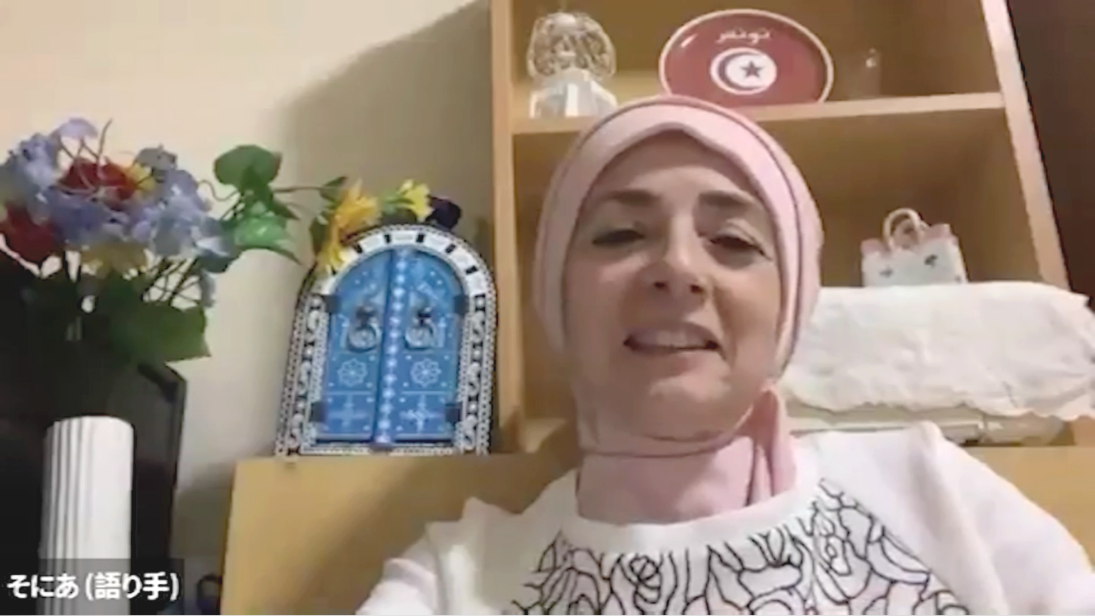
Sonia was born in Tunisia and came to Japan in 2001 when her husband was posted here. She is a member of the Multicultural Square AIAI where she teaches foreign languages (English, French and Arabic).
Moderator: Jung-Hwa Yu
Session team: Rhythm-mix
Jung-Hwa Yu (2nd year, Masters Course, Department of Visual Communication Design)
Ryohei Tanaka (1st year, Department of Design Informatics)
Wang Xin (3rd year, Department of Arts Policy and Management)
Kimiko Matsumoto (CASIO COMPUTER Co., Ltd.)
Sonia became pregnant three months after arriving in Japan and later gave birth to her daughter, making them a family of three. She had a very difficult time when she first arrived in Japan. The language was completely new to her and she had no friends, so she had no way of getting information. This was made worse by the fact that she had no experience in giving birth and raising children in Japan. When she gave birth, she could not understand what the doctors were saying and their body language was different from that used in Tunisia, so she was very worried about the condition of her baby. When her child was in primary school, she also had some very depressing experiences as she could not read the Japanese information handouts the school sent home about excursions and couldn't prepare an obento (packed lunchbox) for her daughter to take with her.
However, since she became a member of the Multicultural Square AIAI community of Japanese and overseas mothers living in Hino City, she says that her life has become much happier. She has met lots of other people in the course of studying the Japanese language and culture and has also found herself a job. For her, AIAI is a network that has connected her with lots of other people.
Sonia is eager to improve her Japanese and she has a dream of writing a book about her own life in Tunisia and Japan, and she is here to talk to you today.
Participant: You said that you have a daughter and that you had some problems when she was small because you couldn't read the printed handouts that were sent home from her school. Did you have any friends among the Japanese mothers at the school?
Sonia: Not at that time, no. That's why it was such a problem.
Participant: Why do think the Japanese mothers didn't come and talk to you?
Sonia: I think it's because, at that time, I didn't speak any Japanese at all.
Participant: But you were able to talk to Japanese people at AIAI?
Sonia: When I joined AIAI, at first I spoke entirely in English, and only gradually learned Japanese.
Participant: Were the teachers at your daughter's school not concerned? Didn't they talk to you?
Sonia: Yes, they did. My daughter interpreted the conversations between me and the teachers. I spoke in Arabic, and the teachers spoke Japanese.
Empathetic Communication
Jung-Hwa Yu
(2nd year, Masters Course, Department of Visual Communication Design)
The preparatory phase was very long, but the teachers and everyone at Casio have all worked hard together and I think we have managed to make progress with a stable and consistent process. That hard work is evident at today's event, with the participants at each session happy to talk to each other and ask questions.
Personally, through this course I have conducted careful interviews while thinking about communication in different cultural spheres and I have worked hard to convey information to other people. I think that these have been important experiences in heightening my capacity for empathy.
"Multicultural co-existence" is an expression that I think I have been aware of because of my perspective as a foreigner and because the opportunities I have been given to think along these lines. Normally, my interactions with other people have been driven solely by my curiosity about how different their cultures are. But I have come to realize that multiculturalism exists and that, as I learn more about the different aspects of other people's cultures, there are some questions that are delicate. When I got to travel to other countries and live there, my words and actions were sometimes seen to have different meanings from those I intended. The same thing often happens even in my own country, but it seems to me that cultural differences become difficult problems the longer you live somewhere as a foreigner. However, for those words and actions, I thought that it is important to be fully aware of what I need to better understand and how others understand me. There have also been amazing instances where, by being aware, my experiences of interacting with foreigners have enabled me to understand the actions of people I could not understand when I was in my own country. These experiences have now given me confidence that, in terms of people understanding the respective words and actions of other people, even where their life experiences have been different, they can convey their intended meaning as long as the idea they want to convey is clear. So, my interpretation of "multicultural co-existence" is that it is an acceptance of things as they are, while understanding your mutual differences and without judging others based on your own understanding or worrying about whether you will be thought to be different.